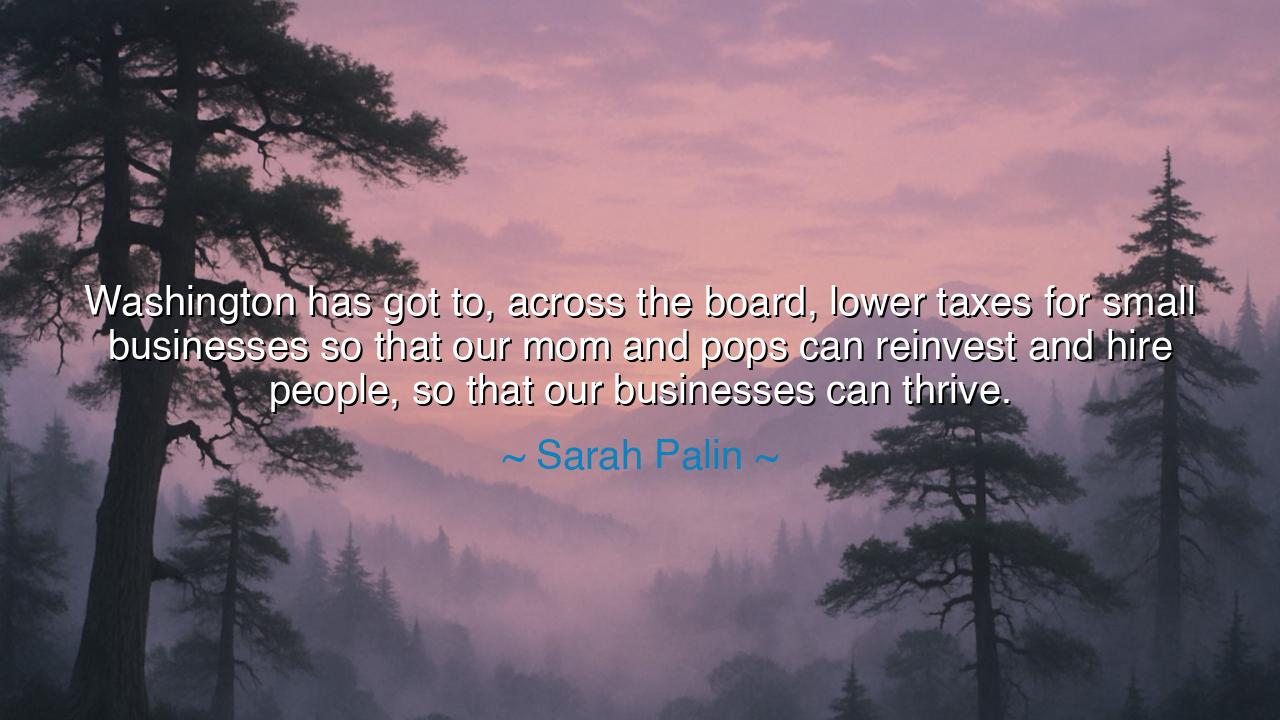
Washington has got to, across the board, lower taxes for small
Washington has got to, across the board, lower taxes for small businesses so that our mom and pops can reinvest and hire people, so that our businesses can thrive.






In the earnest and commanding words of Sarah Palin, we hear both a cry and a conviction: “Washington has got to, across the board, lower taxes for small businesses so that our mom and pops can reinvest and hire people, so that our businesses can thrive.” Though spoken in the language of modern politics, this statement carries within it an ancient principle — that the strength of a nation lies not in its palaces, but in its people; not in the wealth of empires, but in the vigor of its humble workers and creators. Palin, a daughter of Alaska’s frontier and a voice for the ordinary citizen, reminds us here that prosperity must begin at the roots, not at the crown. For as every farmer knows, the health of the tree depends not on the height of its branches, but on the nourishment of its soil.
The origin of this quote lies in Palin’s steadfast advocacy for small businesses, those family-run enterprises — the mom-and-pop shops — that form the living heartbeat of communities across America. In the wake of economic uncertainty, she saw how burdensome taxation and regulation often strangled these smaller ventures, while vast corporations endured with ease. Her words were not spoken only in defense of commerce, but in defense of independence, of the human spirit that dares to create something out of nothing. For the shopkeeper, the craftsman, the farmer, and the local builder — these are not mere participants in the economy, but heirs of the ancient spirit of self-reliance that built civilizations. To lift their burdens is not merely policy; it is honor.
The ancients, too, understood this sacred balance between ruler and ruled, between the state and the people. In the early days of the Roman Republic, Cincinnatus, a humble farmer, was called from his plow to lead his people through crisis. When victory was won, he did not seize power — he returned to his field, content to till the earth once more. Rome’s greatness was not founded on emperors, but on men like him — industrious, free, and unafraid to labor. So too does Palin’s quote echo this old truth: that the strength of a society flows from its producers, not its politicians. To uplift them is to preserve the soul of liberty itself.
Palin’s words speak not only to policy, but to principle — the principle that freedom thrives only when individuals have the power to act, to risk, and to create. Heavy taxation, though often justified in the name of order, can become a subtle chain upon the spirit. When the fruits of one’s labor are taken too heavily, ambition withers, and innovation fades. But when the people are trusted — when the blacksmith keeps his earnings, when the baker reinvests in his shop, when the farmer expands his fields — a nation rises. Each small act of growth becomes a spark, and together these sparks ignite the fire of prosperity.
Consider the story of Henry Ford, who began not as an industrial titan, but as a mechanic in a small Detroit workshop. It was through the freedom to experiment, to save, and to reinvest that he created not only an empire, but a revolution in human mobility. Yet his success would have been impossible under the weight of overreach or distrust. Ford’s story, like that of countless inventors, merchants, and dreamers, shows that when the individual is free, the nation flourishes. This is the spirit that Palin invokes — the call to unleash the creative power of ordinary people, who, given the chance, can achieve extraordinary things.
Yet her words also carry a moral undercurrent, a warning as ancient as it is modern: wealth without justice becomes tyranny. To protect the small is to preserve the moral fabric of society. For when the gap widens too far — when those who labor are crushed beneath the weight of those who rule — bitterness grows, and the foundation of peace begins to crack. Lowering the burdens of honest work is not only good economics; it is good governance. It honors the dignity of toil and rewards the courage to strive. It reminds us that a government’s purpose is not to enrich itself, but to safeguard the conditions in which its people can thrive.
Thus, the lesson of this quote transcends time and place: prosperity is born from empowerment, not dependence. Let every nation remember this truth — that to strengthen its people is to strengthen itself. Let every leader recall that taxes are not merely numbers, but lifeblood taken from the heart of creation. And let every citizen, whether a shopkeeper or a craftsman, honor the sacred calling of their work — to build, to serve, to enrich their community.
In the end, Sarah Palin’s plea is not just for economic reform, but for renewal of spirit. She speaks to the eternal covenant between freedom and responsibility — that those who govern must do so with humility, and those who labor must be given room to grow. Her words remind us that the most beautiful economy, like the most beautiful civilization, is one built upon fairness, courage, and respect for the common man. So let us nurture our small businesses, our families, and our communities. For they are not the fringe of society — they are its very foundation, the enduring light of a people who still believe in the promise of their own hands.






AAdministratorAdministrator
Welcome, honored guests. Please leave a comment, we will respond soon